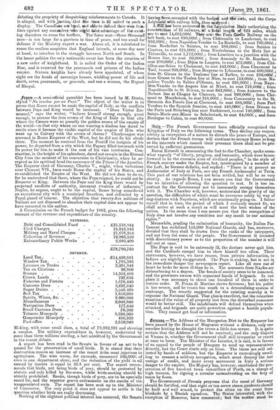Sfalii — The French Government have officially recognized the Kin g d om of Italy
on the following terms. They decline any respon- sibility in enterprises of a nature to disturb the peace of Europe, and declare that the French troops will continue to occupy Rome so long as the interests which caused their presence there shall not be pro- tected by sufficient guarantees.
Baron Ricasoli in announcing the fact to the Chamber, spoke some- what vaguely "of liberty, progress, and humanity, which were hence- forward to be the common aims of civilized peoples," in the style of French oratory under the Empire, but, interrogated by a member of the Left, he became definite, and replied : "There is at present no Ambassador of Italy at Paris, nor any French Ambassador at Turin. This part of our relations has not been settled, but will be so very shortly. As regards Rome, I can assure you that the Government has no intention of allowing the question to rest. It is too im- portant for the Government not to incessantly occupy themselves with it. The Chamber will, however, understand the gravity of the question, the difficulties of which must be overcome solely by way of negotiations with Napoleon, which are continually going on. I flatter myself that in time, the period of which I certainly cannot fix, we shall arrive at such a result as will meet the best wishes of the nation. In the mean time I can assure you that the recognition of Italy does not involve any condition nor any insult to our national rights." Meanwhile, pending the culmination of humanity, the Italian Par- liament has mobilized 143,000 National Guards, and has, moreover, decided that they shall he drawn from the ranks of the ratepayers, and not from the mass of the people. The Government is invested with discretionary power as to the proportion of the number it will call out at once.
The Pope is said to be extremely ill, the doctors never quit him, and the Cardinals compel him to show himself too often. These statements, however, we have reason, from private information, to believe are slightly exaggerated. The Pope is sinking, but is not in the immediate danger the newspapers report. Like all men out of heart be looks far more ill than he is. The accounts from Naples are disheartening to a degree. The bonds of society seem to be loosened, and the provinces swarm with organized bands of brigands. In one place it was necessary to shoot one hundred of them in order to restore order. M. Ponza di Martino shows firmness; but his police is too severe, and he trusts too much to a demoralizing system of espionage. The remedy suggested for the existing anarchy is to organize the National Guard. That planis excellent, but the relentless exaction of the value of all property lost from the disturbed commune would be better still. The inhabitants will defend themselves when attacked, and brigands are quite powerless against a hostile popula- tion. They cannot get food or information.






























 Previous page
Previous page